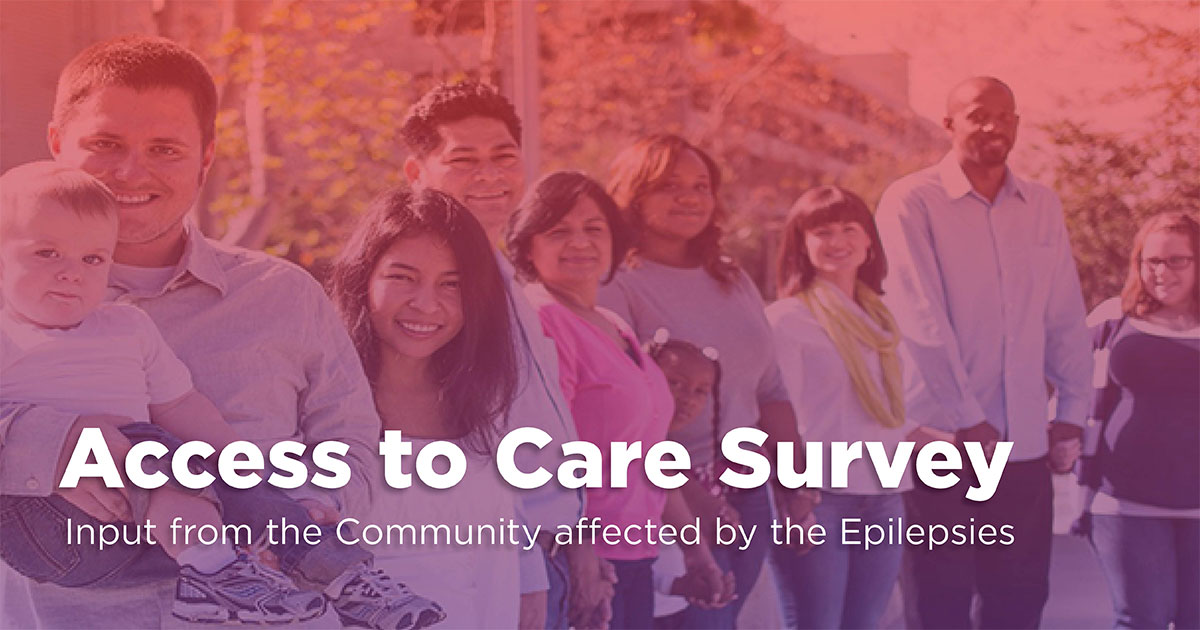Survey Results for Access to Epilepsy Health Care

Epilepsy News From: Sunday, August 16, 2020
Access to affordable, quality, provider-directed and person-centered health care is critical for people with the epilepsies. The Epilepsy Foundation conducted a survey of our community in October 2019 to better understand what challenges—if any—people with the epilepsies are facing with accessing the health care they need. The participants for the survey were not recruited through random selection and therefore any results should not be generalized to a broader population. Participants were recruited through convenience sampling; the survey was distributed through the Epilepsy Foundation's and partner organizations' communications channels. The Epilepsy Foundation is committed to doing representative samples in the future, but with this data, we can start to better understand the experiences of people with the epilepsies, improve systems that connect people to epilepsy health care and advocate for improved access to care.
In addition to this survey, recognizing that the COVID-19 pandemic is impacting people with the epilepsies’ needs and how people are accessing health care, the Epilepsy Foundation sent an additional survey in April-May 2020 near the beginning of the COVID-19 pandemic to learn about potential emerging trends that could impact access to care. The COVID-19 survey was distributed through epilepsy.com and social media channels.
Read the reports:
Highlights of both reports are provided below.
Access to Care Survey Highlights
We received 1,564 complete responses. 53.9% of respondents live with epilepsy and 42.8% are the parent of a child(ren) with epilepsy (note: some individuals both live with epilepsy and are the parent of a child(ren) with epilepsy). Most (61.5%) received their epilepsy diagnosis more than 10 years ago. 8.6% indicate living with a rare epilepsy. Health insurance was varied and some individuals rely on more than one form of insurance. 51.7% rely on employer-sponsored coverage, 23.3% on Medicaid, 23% on Medicare and smaller percentages on other forms.
- 59% reported challenges with health insurance. Of those with health insurance challenges, the most often cited challenge (42.2%) was that the amount they pay is too high, followed by paperwork getting in the way (29%) and a needed service, test or treatment being denied (24.4%).
- For their epilepsy care and treatments, most (61.8%) see a neurologist, 26% see a primary care physician and 18.6% see an epileptologist.
- 59% have never been to an epilepsy center for treatment and of those, 96% have never been referred.
- 45% reported challenges seeing a neurologist or epileptologist. Of those, the biggest challenge (58.9%) was a long wait for an appointment.
- 70% reported challenges with anti-seizure medications. Of those, the top challenges were side effects (53.86%), cost (34.14%) and challenges with formulary switches (31.71%).
COVID-19 Survey Highlights
We received more than 600 responses—75% of whom live with epilepsy. This survey was open April 20-May 16, 2020, a little more than 3 months into the U.S.-declared public health emergency. We recognize that the impact on individuals and families has likely evolved as the pandemic and public health emergency have continued. During the initial phase of the COVID-19 response, this is how people responded:
- Of the overall challenges created by the COVID-19 pandemic, the biggest reported challenge was delayed routine medical appointments (35.84%). 25.56% reported no challenges or delays.
- 84% reported no change or delays in taking their epilepsy medications, while 14% said it’s been harder for them to take their epilepsy medications as prescribed.
- With people accessing care through telehealth, 33% felt very prepared for their virtual medical appointments, 37% felt somewhat prepared and 17% did not feel prepared. 9% had not been able to get a virtual medical appointment and 4% did not know what one is.
- People indicated that the following have been negatively impacted due to COVID-19: 42% emotional health; 35% sleep; 22% employment.
- 42% of respondents have not been able to access needed mental health and/or social services.
Authored by
Epilepsy Foundation Advocacy
Reviewed by
Epilepsy Foundation Communications
Reviewed Date
Sunday, August 16, 2020
